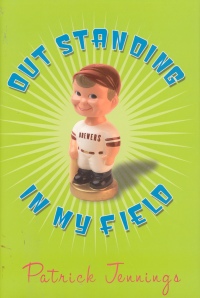| ________________
CM . . .
. Volume XI Number 15 . . . .April 1, 2005
excerpt:
This quote, from baseball legend Ty Cobb, crystallizes the central problem of Out Standing in My Field. Young Ty Cutter, who plays right field for the Babylon (Arizona) Brewers, is a disappointment to his father, the coach. Known as "The Professor," although he is a barber, Ty's dad played six years in the farm leagues, a little semi-pro, and one day in the major leagues. This was both the best day and the worst day of his life in that he had an opportunity and blew it. The Professor is a perfectionist who drinks too much and finds life, and his son, frustrating. When one of Ty's friends says that the Professor will probably "have to do the twelve steps," Ty says, "I don't see how dancing is going to help," even though his father has a secret weakness for Gene Kelly movies. Off the baseball field, Ty's life is dominated by his father who has him on a schedule which includes yard work where Ty comes "face to face with the wide variety of Arizona's venomous insects and reptiles." The Professor allows him to watch baseball on TV because it is instructive. Author Patrick Jennings endows Ty with wit. Of the Pee Wee League field, he says, "The place is tetanus waiting to happen." Ty tells "Professor" anecdotes. The Professor doesn't believe in treating wounds, for instance, because he believes that "Winners don't get infected. Strong mind, strong body." "It was this line of thinking that landed the man in the Babylon Community Hospital last fall," Ty continues. While opening a carton of shaving foam, Ty's father pulled back a thumbnail but refused to treat the wound. His arm became swollen up and pus flowed. A doctor, who happened to be at the barbershop for a haircut, diagnosed a staph infection and dialled 9-1-1. As Ty plays out the season, he undergoes much stress and embarrassment, with occasional luck on the field. He loves the game for reasons that Ty Cobb would scorn; for instance, the pungent aroma of his mitt, and the company of other players. The youngsters reflect the cultural background of Arizona, with names like "Jesus," "Angel" and "Isidro." Ty's mother, the town administrator, is overwhelmingly supportive of her son, who doesn't excel at anything. The most interesting secondary character is Ty's sister Daisy, a talented baseball player who refuses to play. She is officially on the team but serves as its statistician because she sees baseball as "pure geometry." Ty remarks, "Her walls aren't plastered with pictures of pop singers or TV shows. Her walls aren't plastered with anything. She says the blank walls help her mind run free." Eventually, she breaks her vow and plays for the Brewers during a key game because her father tells her he needs her. She also has a simple solution to Ty's dilemma: "Ask Dad to bench you." Ty muses about her advice and internalizes something that he has already half-known:
Here one sees another level of meaning in the title. Instead of trying to please his father by standing out in the Arizona heat waiting for a baseball to hit him, Ty decides to choose his own fields of endeavor and become "outstanding in [his] field. He will continue playing baseball, but on another team, with a coach other than his father. Patrick Jennings understands the great importance, to a child, of the parent of the same gender, and the difficulty of asserting an independent identity. He writes subtly and humorously to encourage thinking outside the box (or diamond.) Highly Recommended. Ruth Latta of Ottawa, ON, is a teacher/writer/editor. Her mystery novel, Tea With Delilah, was published in November 2004 by Baico Publishing of Gatineau, PQ.
To comment
on this title or this review, send mail to cm@umanitoba.ca.
Copyright © the Manitoba Library Association. Reproduction for personal
use is permitted only if this copyright notice is maintained. Any
other reproduction is prohibited without permission.
NEXT REVIEW |
TABLE OF CONTENTS FOR THIS ISSUE
- April 1, 2005.
AUTHORS |
TITLES |
MEDIA REVIEWS |
PROFILES |
BACK ISSUES |
SEARCH |
CMARCHIVE |
HOME |
